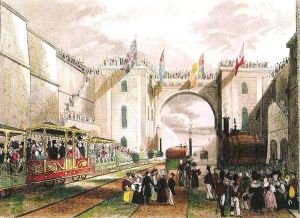The driver pressed the regulator down, and held it. The locomotive hurled down the track, it swayed from side to side as it went faster that it was ever intended to. The driver was worried, everything had been going so well.
The line had been opened with flags and bands, the Prime Minister had been greeted by the directors and the local Member of Parliament, after the usual delays the engines had set off in procession, the crowds had cheered and all was well. Apart from the engineers who had built them no one had seen machines like the locomotives before and everyone was filled with wonder.
And then disaster, they had stopped to take on water, and whilst they waited the most famous of all the engines had run up and down for all to see. The passengers had been told to wait in the carriages, but hadn’t listened. Then the local MP stepped across to see the Prime Minister, straight in front of the locomotive. His leg had been crushed and now the fastest of the new engines was pulling a single coach, carrying the injured man, towards the nearest town and a doctor.
The driver thought back, how they had laughed when he had told them that his engine could travel at ten miles an hour. How, later when his engines were doing ten miles an hour, the directors had begged him not to suggest that he would be travelling at twenty, as they would loose government support. Then at the trials of the locomotives he had taken her up to twenty five, and now, what was she doing.
He looked down at his son who was stoking.
“What speed lad?” he asked.
Robert pulled a watch from his pocket and looked at the markers by the track, he knew them all. Then, as he carefully shovelled more fuel into the fire box, he did the calculations in his head, he was always better at arithmetic than his father. He looked up at the older man in wonder.
“Forty-two miles an hour, we are travelling faster than anybody has ever travelled before!”
His father only grunted as he reduced speed for the bend. ‘But will we ever travel faster?’ he thought. With the main supporter of the line dying behind him, what chance was there that the railway would continue? Who would want to travel on it again?
The dying man was carried gently to the nearest house where he was soon to die, and slowly now the driver returned to the carriages and the procession made its sombre way along the line. Perhaps, many thought, for the last time.
And then –
In the MPs pocket was found the speech that he was planning to give at the banquet after the line had been opened. It praised the line and looked forward to the prosperity it was to bring to the towns it linked. It was published in all the newspapers as his dying words, his dying wish. The line prospered, and the rest – as they say – is history.

This story is true, the opening of the Liverpool and Manchester Railway was marred by the accidental death of the local MP. William Huskisson. In taking him to a doctor George and Robert Stephenson took the Northumbrian, to speeds above forty miles an hour and so set the first land speed record.

Nicely told; is this my QI moment where all the bells go off if I make a pun about going off like a rocket?
LikeLike
The bells might ring, Huskisson was hit by the Rocket. It was making a demonstration run as it had already become the most famous locomotive in the world, when the total number of steam locomotives hardly ran into double figures. However the speed record was taken by Northumbrian, the next generation of steam locomotives.
LikeLike
You brought that piece of history to life, Gordon
LikeLike
Yes you made it all so interesting!
LikeLike
Pingback: Inspired by a Letter, or a Tale for Dickens | The Curious Archaeologist
You write a great story!
LikeLike
Pingback: The Most Remarkable Georgian Invention | The Curious Archaeologist